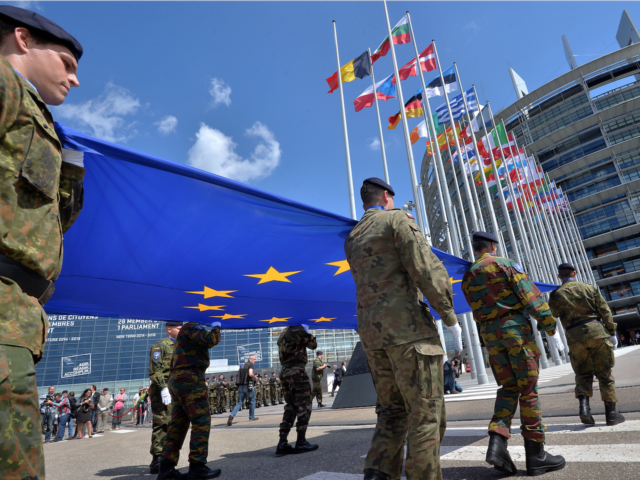Plans for a European Union (EU) army, including a centralised headquarters and “permanent structured defence co-operation,” have been leaked despite the EU attempting to hide the plot until the day after the Brexit vote.
The European Commission had been keeping the plans in a sealed room, which could only be entered by a small number of EU political and security committee ambassadors, leaving all electronics at the door.
However, one individual managed to take notes and leak them to The Times. It was revealed that in terms of how the EU functions, “security and defence [are] where a step change is most urgent”.
Federica Mogherini, head of foreign policy in the EU, has allegedly spent years preparing the plans, conveniently due to be discussed by EU leaders just one week after Britain’s referendum.
The plans will, of course, be seen as a major power grab, and an incursion on national sovereignty and the effectiveness of NATO in the lead up to the Brexit vote – thus the secrecy.
The UK vetoed similar proposals in 2011, and David Cameron and the Ministry of Defence (MoD) continue to deny an EU army is possible.
“We now see another EU lie exposed. The EU wants an EU army,” UKIP leader Nigel Farage told LBC radio this morning.
Despite the leaks, Ms. Mogherini’s spokesman continued to claim that the defence plan would “in no way aim to set up the EU army”.
“When I spoke about an emerging EU army [before the general election], Nick Clegg described it as ‘dangerous fantasy’ – Not much fantasy here,” Mr. Farage added on Twitter.
According to the diplomatic note, the plan adds: “The EU can step up its contribution to Europe’s security and defence”.
Continuing: “Our external action must become more joined up across policy areas, institutions and member states. Greater unity of purpose is needed across the policy areas making up our external action.”
It warns that “in turbulent times, we need a compass to navigate the waters of a faster-changing world,” and urges the EU to create defence structures using mechanisms set out in the 2009 Lisbon treaty, which would be modelled on the EU’s Brussels-based diplomatic service.
Despite the UK’s veto, there are concerns that a loophole could allow nine states to group together and bypass opponents.
France and Germany have long been vocal supporters of an EU army. A white paper from the German parliament, laying out their plans to push ahead, was leaked last month after they, too, tried to suppress the legislation until after a Brexit vote.
The EU Navy, meanwhile, has been existent for some time. Euavfor is a central command for EU-directed naval operations, which EU countries are required to supply warships to.
Last month, Breitbart London revealed how 600 members of various European police and military forces had carried out an EU funded training exercise in Germany, preparing for major civil unrest and even war.
And, just last week, it was reported that two British Army divisions had joined a 1,500-strong EU Battlegroup training in the British countryside adorned with EU flags.
Despite all this, a Ministry of Defence spokesman insisted: “We will never be part of an EU army. We retain a veto on all defence matters in the EU and we will oppose any measures which would undermine member states’ military forces.”
Field Marshal Lord Guthrie of Craigiebank, former Chief of the Defence Staff and a supporter of Remain, slammed the development: “It is silly to have a duplication of NATO . . . We want to spend the money on defence, not bureaucracy.”
Liam Fox, former Secretary of State for Defence and a Brexit campaigner, said that the plans would “weaken NATO and undermine our security to boost the EU’s dream and continued aim of ever closer union”.
He added: “This is our last chance to stop being dragged into a permanent EU military force.”

COMMENTS
Please let us know if you're having issues with commenting.